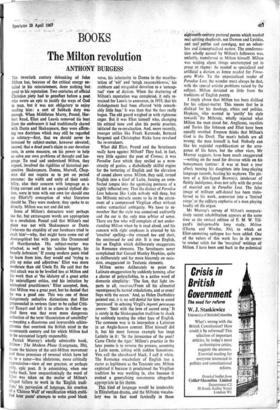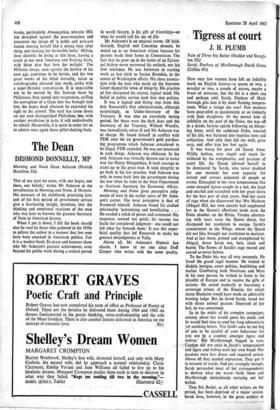The Milton revolution BOOKS
ANTHONY BURGESS
The twentieth century debunking of John Milton has, because of the critical energy en- tailed in his reinstatement, done nothing but good to his reputation. Two centuries of official Christian piety had to genuflect before a poet who wrote an epic to justify the ways of God to man, but it was not obligatory to enjoy reading him: a sort of Sabbath duty was enough. When Middleton Murry, Pound, Her- bert Read, Eliot and Leavis removed his bust
from the embrasure it had traditionally shared with Dante and Shakespeare, they were affirm- ing two doctrines which may still be regarded as salutary—first, that we should never be bemused by subject-matter, however elevated; second, that a dead poet's claim to our devotion rests, in some measure, on his power to help us solve our own problems of thought and lan- guage. To read and understand Milton, they argued, involved the rigidities of historical per-
spective. Shakespeare, Donne, Marvell, Chap- man did not require us to put on period
costume: the width and unity of their sensi- bility, also their concern with language as a living current and not as a special stylised dic- tion, were in tune with our own (or should one say Eliot's?) conception of what literature should be. They were modern; they spoke to us directly. Milton was not and did not.
Some of Milton's detractors went perhaps too far, but extravagant words are appropriate to a revolution. Pound said that Milton's real place was not with Shakespeare or Dante (whereto the stupidity of our forebears tried to exalt him'—why, that might have come out of Areopagitica) but with poets like Drummond of Hawthornden. His subject-matter was attacked, as well as his 'asinine bigotry, his beastly. hebraism.' If young modern poets tried to learn from him, they would end 'trying to pile up noise and adjectives.' Eliot was more moderate than old Uncle Ez. He said that the real attack was to be levelled less at Milton and
his work than at 'the idolatry of a great artist by unintelligent critics, and his imitation by uninspired practitioners.' Eliot accepted, then, that Milton was a great poet, but he denied that he was a good one. This was one of those dangerously seductive distinctions that Eliot propounded in reviews (later to be called Criti- cal Essays) and left it to others to follow up. And there was that even more dangerous seduction of the term 'dissociation of sensibility' —meaning a disastrous and irreversible schizo- phrenia that overtook the British mind in the seventeenth century and for which Milton had to be accounted largely responsible.
Patrick Murray's wholly admirable book, Milton: The Modern Phase (Longmans, 300, traces the history of the anti-Milton movement and those processes of reversal which have led us to a saner—less idolatrous, more critically appreciative—view of our greatest, or perhaps Only, epic poet. It is astonishing, when one looks back, how unquestioningly the word of Eliot was taken on the matter of Milton's alleged failure to work in the 'English tradi- tion,' his perversion of language, his erection of a 'Chinese Wall' of versification which stulti- fied later poets' attempts to write good blank
verse, his inferiority to Donne in the manifes- tation of `wit' and 'tough reasonableness,' his stubborn and misguided devotion to a 'concep- tual' view of diction. When the shattering of Milton's reputation was completed, it only re- mained for Leavis to announce, in 1933, that his dislodgement had been effected 'with remark- ably little fuss.' It was then that the fuss really began. The old guard weighed in with righteous anger. But it was Eliot himself who, changing his critical tune and also his poetic practice, initiated the re-revaluation. And, more recently, younger critics like Frank Kermode, Bernard Bergonzi and Christopher Ricks have revalued the re-revaluers.
What did Eliot, Pound and the Scrutineers really have against Milton? They had, in fact, very little against the poet of Comus; it was Paradise Lost which they reviled as a mon- strosity of genius, a diabolically skilful engine for the torturing of English and the elevation of sound above sense. Milton, they said, turned English into a kind of Latin, forcing an unin- fleeted tongue into the agonising postures of a highly inflected one. That the dialect of Paradise Lost behaves like Latin nobody will deny, but the Miltonic miracle seems to lie in the attain- ment of a compressed Virgilian effect without undue syntactical ambiguity. We have to re- member that the style was conceived auditorily and the ear is the only true arbiter of sense. There are few who will complain of not under- standing Milton when he is read aloud, and his concern with right emphases is attested by his 'creative' spelling—the stressed hee and their, the unstressed he and thir. It is true English, but an English which deliberately exaggerates its Romance elements. The Scrutineers never complained that Gerard Manley Hopkins, quite as deliberately and far more bizarrely on occa- sion, exaggerated its Teutonic elements.
Milton seems deliberately to point the Latinate exaggeration by suddenly homing, after a cluster of polysyllables, to a native word of domestic simplicity : 'The Sun, that light im- parts to all, receives/From all his alimental recompense/In humid exhalations, and at even/ Sups with the ocean.' And, as Helen Darbishire pointed out, it is no self-denial for him to avoid 'percussed' in echoing Virgil's in genii percussus amore: 'Smit with the love of sacred song.' It is surely in the Shakespearian tradition to shock by suddenly turning the other face of English. The common way is to interpolate a Latinism in an Anglo-Saxon context. Eliot himself did it, but his most famous example has inept Latinity in it: 'In the juvescence of the year/ Came Christ the tiger.' Milton's practice in the later poems is to reverse the process, assuming a Latin norm, jolting with sudden Saxonisms. You call the chessboard black, I call it white. The Romance vocabulary of English has a status as legitimate as the Teutonic one. Milton exploited it because it proclaimed the Virgilian tradition he was working in, also because it evoked a generalising remoteness altogether appropriate to his theme.
This kind of language would be intolerable in Elizabethan drama, and the Miltonic vocabu- lary was in fact used farcically in those eighteenth-century pastoral poems which needed real spitting shepherds, not Damon and Lycidas, and real nettles and cowdiAng, not an odour- less and Conceptualised nature. The condemna- tion wholly earned by Milton's followers was, unfairly, transferred to Milton himself. Milton was writing about things unattempted yet in prose or rhyme: he needed as specialised and artificial a diction as Joyce needed for Finne- gans Wake. To the unprejudiced reader of Paradise Lost, the wonder must always be that, with the special artistic problems raised by the subject, Milton deviated so little from the traditions of English poetry.
I imply above that Milton has been disliked for his subject-matter. This means that he is disliked for his theology, ethics and politics. Hopkins, who wanted to 'purify' his style towards the Miltonic, wholly rejected what Milton the man stood for. Anglicans, royalists and Tories like Johnson and Eliot have been equally revolted. Empson thinks that Milton's God is the Devil. The man's beliefs are all wrong; the man himself is bad. Nobody can like his regicidal republicanism or the arro- gance of his hates, but the other vices, Mr Murray suggests, have been much exaggerated —writing on the need for divorce while on his honeymoon (untrue: it was at least a year after), turning his daughters into long-playing language records, beating his nephews. The pic- ture of a thin-lipped Brownist, intolerant of fleshly indulgence, does not tally with the praise of married sex in Paradise Lost. The false image of militant self-denial has been trans- ferred to his work, converted into a 'limited range' or the solitary euphoria of a man playing loudly oil tffe organ.
Mr Murray's survey of Milton's compara- tively recent rehabilitation appears at the same time as the revised edition of E. M. W. Till- yard's indispensable long study, Milton (Chatto and Windus, 30s), to which an Eliot-answering epilogue has been added. One of the values of this work lies in its power to rewhet relish for the 'marginal' writings of Milton. I have been sent back to the polemical
books, particularly A reopagitica, wherein Mil- ton inveighed against the press-muzzlers and presented the image of 'a noble and puissant nation rousing herself like a strong man after sleep, and shaking her invincible locks.' Milton, thou shouldst be living at this hour, having a crack at our own `timorous and flocking birds, with those also that love the twilight.' The Miltonic image, seen against the history of his own age, continues to be heroic, and the two great works of his blind maturity, taken as autobiography elevated into myth, strike with a super-Byronic romanticism. It is impossible not to be moved by this Samson beset by Philistines, fury tamed into resignation, sniffing the corruption of a Gaza that has brought him low, the hopes dead whereon he expended his sight to the utmost. The roof has come down on our own distinguished Philistines, but, with another revolution in taste, it will undoubtedly be rebuilt. Meanwhile, it is quite in order for us to admire once again those pillar-shaking feats.







































 Previous page
Previous page